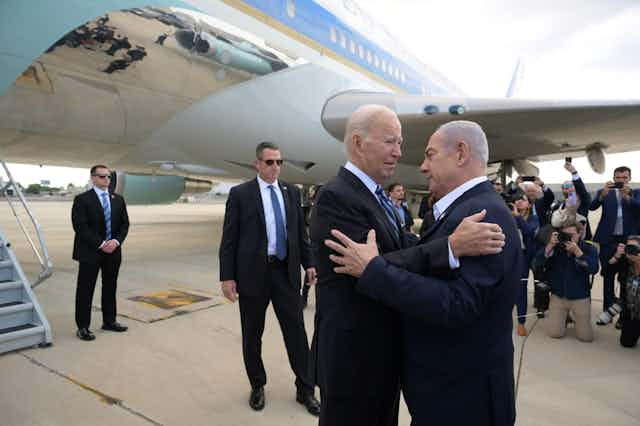Before the recent Hamas attack on Israel, the country’s relations with US looked frayed. The right-wing coalition government of Binyamin Netanyahu, which includes members of several far-right parties, had unleashed domestic upheaval by trying to weaken the country’s judiciary. The US president, Joe Biden, warned Netanyahu several times not to rush ahead with his plans, calling for Israel’s government to seek consensus.
Biden said repeatedly that Netanyahu would not be invited to the White House “in the near term”. A rather tepid meeting subsequently took place on the margins of the United Nations annual meeting, but it was marked by the lack of warmth between the two leaders.
Biden reportedly warned Netanyahu against the judicial overhaul and also called for Israel to improve conditions in the West Bank, where there had been violence between Palestinians and settlers. The aloofness between the two leaders could have been construed as reflecting a deepening rift in the strategic alliance between Israel and the US.
But Biden’s response to the terrorist attacks by Hamas against Israel on October 7, in which more than 1,300 people were killed and more than 200 kidnapped, dispelled such speculation. In his televised response the president recognised how the attacks “brought to the surface painful memories and the scars left by a millennia of antisemitism and genocide of the Jewish people”.
“So, at this moment”, he continued, “we must be crystal clear: We stand with Israel.”
The president ended his short address by issuing a stark warning to “any country, any organisation, anyone thinking of taking advantage of this situation” not to.
The following week during his visit to Israel on October 18 2023, Biden stated that the explosion at the Al-Ahli hospital in Gaza, which killed scores of Palestinians, was done by “the other team”. This echoed the Israeli claim, which has been contested by the Palestinians, that the blast was caused by a missile fired by the Palestinian Islamic Jihad that fell short.
Unwavering support
These remarks capture the essence of the unprecedented support the US has provided Israel since the October 7 attack. On a personal level, Biden is of a generation of leaders of the Democratic party that are committed to the idea of Zionism and that the existence of the state of Israel is indispensable for the security of Jews in their homeland and around the world.
Yet the president’s personal commitment to Zionism provides only part of the explanation for why the United States has provided unprecedented support to Israel. Biden is the first US president to visit Israel during a war, and the US military deployed significant military forces – including the Gerald Ford aircraft carrier strike group – to the eastern Mediterranean.

This display of military strength, which was coupled by US economic and political support for Israel, was designed to achieve three goals. The most important aim is to deter Iran and its proxy, the Lebanese anti-Israel militant group Hezbollah, from launching a full blown attack on Israel in support of Hamas. This would transform the Israel-Hamas war into a regional conflict.
Read more: Hamas and Hezbollah: how they are different and why they might cooperate against Israel
Achieving this goal is critical for allowing Israel to achieve its stated aim of destroying Hamas’s military capabilities and its ability to govern the Gaza Strip. For Washington, it is also vital to assure other US allies – most notably Saudi Arabia – that the Biden administration is committed to keeping Iran contained.
The second aim of the US display of solidarity with Israel is to increase US influence on the Israeli war cabinet. Thanks to its supply of military aid and strategic support, the US will have significant input into Israeli decision making. Washington wants to ensure that Israel does not open a second front on its border with Lebanon by launching an offensive against Hezbollah – unless Hezbollah launches a full-blown attack on Israel first.
The US is also keen to avoid Israel reoccupying the Gaza Strip and to ensure humanitarian aid is allowed to enter Gaza throughout the war. As Biden puts it, the US wants to encourage “lifesaving capacity to help the Palestinians who are innocent”.
Global perspective
Beyond the Middle East, US support to Israel seems consistent with the strategic outlook of the Biden administration, which is markedly different from the previous Democratic administration of Barak Obama.
Under Obama, the US failed to react to the Russian annexation of Crimea and the Bashar Al-Assad regime’s use of chemical weapons against its own citizens. This has subsequently been blamed for giving unintended encouragement to Russia in its invasion of Ukraine in February 2022.
Read more: Ukraine war: how the west's weak reaction to Crimea's referendum paved the way for a wider invasion
By contrast, the Biden administration has stepped firmly up to the plate, both in supporting Ukraine against the Russian invasion and by offering strong backing to Israel in the wake of the attack launched by Hamas.
This is a clear signal by the US that it will support its allies against the emerging anti-western axis of China, Iran and Russia. This global strategic outlook is as important in understanding US support of Israel as is the “special relationship” between the two states.

